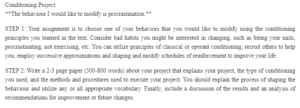Conditioning Project
Procrastination is a problem that I have faced ever since I was young. Whenever I am given a task, I tend to postpone doing it until such a time that I feel I have no choice but to do it. This problem is particularly evident whenever I am required to submit an assignment or read for my exams. I know that reading early will benefit me, but as long as the exam is not yet around the corner, I will not be as committed to reading for it. I also experience it whenever I am supposed to travel. Instead of making early arrangements and purchases days before, I do these things at the very last minute. This often causes me to panic and get anxious about whether I have done everything I ought to have done. After performing a self-reflection, I discovered that this habit is more harmful than beneficial to me. Therefore, I embarked on a mission to change my behaviour using concepts we had learned regarding conditioning. This project will focus on my steps to change my behaviour.
Operant conditioning is a learning method in which punishments and rewards for behaviour are employed (McLeod, 2018). A link is usually made between one’s behaviour and the consequence of such behaviour. I employed operant conditioning to alter my behaviour. Since my behavior of procrastination is common in various things, I decided to begin with certain tasks, such as putting an end to procrastination regarding assignments alone. I agreed with my neighbour. I shared my school timetable with him so he knew of my pending assignments and tasks. After that, I gave him the remote to my thermostat and told him to adjust the temperature up or down to uncomfortable but safe temperatures whenever I failed to complete certain tasks within a specific timeframe, days before the actual due date. My neighbour would then lock me in the room to prevent me from leaving for an unpredictable amount of time and only alter the temperature back to normal once I had the evidence of my task completion. My neighbour would perform this regularly. To better help me, he said that he would accompany me for a swim whenever I completed my tasks. I love swimming, but I barely get someone to tag along with me, so that was a big deal for me. Over time, I became more responsible and could complete my tasks before the due date.
Are you interested in an unpublished edition of the assignment ? Get in touch with us. Our team of experts is ready to help.
In this case, I used what is referred to as positive punishment and positive reinforcement. In positive punishment, an unfavourable outcome is presented to weaken the following reaction. On the other hand, positive reinforcement involves presenting a favourable outcome after a certain behaviour. According to Pietrangelo (2020), positive punishment is highly effective whenever it takes place immediately after the unwanted behaviour, and it works best when it is applied regularly and is used along with other methods like positive reinforcement. In this case, positive punishment (adjusting the thermostat) was done whenever I failed to complete my tasks before a certain date. This punishment was done at a fixed interval schedule as my neighbour would alter my thermostat any time I failed to do my assignment before the deadline, albeit at different intervals. Regarding positive reinforcement, variable ratio schedules were used as he only took me for a swim after I had finished my assignments many times. This highly reinforced my behaviour as he kept me guessing when he would agree to go swimming with me.
Generally, the conditioning was highly successful as I was forced to adhere to specific deadlines to avoid the highly uncomfortable temperatures. Today, whenever I feel a difference in my room temperature, even during summer, my first response is normally to check if I have any pending assignments. This is the concept of generalization since I associate any temperature change with my friend’s alteration of my thermostat and believe I am being punished for failing to meet a deadline. If I were to do this experiment again, I would probably consider modifying my procrastination of other things, like early preparation for a trip.
References
McLeod, S. (2018). What Is Operant Conditioning and How Does It Work? Simply psychology. https://www.simplypsychology.org/operant-conditioning.html
Pietrangelo, A. (2020, 25 February). What Is Positive Punishment? Healthline. https://www.healthline.com/health/positive-punishment
ORDER A PLAGIARISM-FREE PAPER HERE
We’ll write everything from scratch
Question

Conditioning Project
Conditioning Project
**The behaviour I would like to modify is procrastination.**
STEP 1: Your assignment is to choose one of your behaviours that you would like to modify using the conditioning principles you learned in the text. Consider bad habits you might be interested in changing, such as biting your nails, procrastinating, not exercising, etc. You can utilize principles of classical or operant conditioning, recruit others to help you, employ successive approximations and shaping and modify schedules of reinforcement to improve your life.
STEP 2: Write a 2-3 page paper (500-800 words) about your project that explains your project, the type of conditioning you used, and the methods and procedures used to execute your project. You should explain the process of shaping the behaviour and utilize any or all appropriate vocabulary. Finally, include a discussion of the results and an analysis of recommendations for improvement or future changes.

